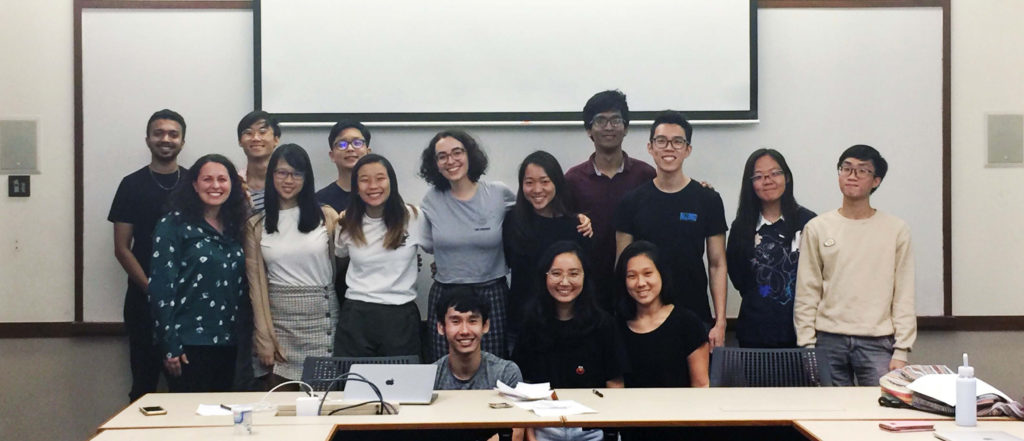Eye-opening special seminars at Yale-NUS conducted by Yale faculty
From 11 to 15 March 2019, six faculty and staff members from Yale University conducted Special Seminar classes for students at the Yale-NUS campus. Over five classes that were conducted on consecutive days, students had the opportunity to learn a highly specialised subject and/or skill from esteemed visiting Yale faculty. This year, the seminars covered a diverse range of topics, from international relations to Southeast Asian arts and material literacy.
One of the six seminars, titled ‘Earth Materials (Minerals) and Human Health’, introduced students to the rapidly expanding field of Medical Geology. The seminar was taught by Ruth Blake, Professor of Geology & Geophysics, Forestry & Environmental Studies & Chemical & Environmental Engineering at the Yale School of Engineering and Applied Science.
“The over-arching goal of the course is to convey that the solid Earth is the primary source of chemical elements (in the form of minerals and fossil fuels) used to manufacture all of the materials and goods that support human civilisation and modern life, “ explained Professor Blake. She added that the course also aimed to get students to consider the environmental and health consequences of extraction (e.g. mining) and transformations (e.g. cycling by microbes, plants) of elements as they flow through the environment and into the human body.
For Kurumi Ota (Class of 2021), an aspiring Chemistry major, the seminar perfectly coincided with one of her academic interest areas, Geochemistry. Given that Geochemistry is a “vast, interdisciplinary field with so many points of entry” and that there are currently no geochemists in the Yale-NUS faculty, she saw this as a very good opportunity for her to explore the field and learn from an expert.
“It was very eye-opening for me when I realised how omnipresent minerals are in our surroundings and daily lives, such as in our self-care products. I can’t imagine going back to the past before taking this class when I bought skincare products based off advertisements and applied them to my skin without bothering to check the ingredients,” said Kurumi.
Meanwhile, Professor Blake commented that she found Yale-NUS students to be “amazing, real troopers”, who remained engaged and participated enthusiastically in all in-class activities despite the late class times.
For Atharva Brahmecha (Class of 2021), the seminar ‘From Text Mining to Mapping: Digital Humanities Method’ similarly appealed to his academic interests. Having an interest in both computer science and literature, he was curious about what it meant to apply data analysis techniques to the Humanities.
 Dr Catherine De Rose and students at the special seminar ‘From Text Mining to Mapping: Digital Humanities Method”. Image provided by Dr Catherine De Rose.
Dr Catherine De Rose and students at the special seminar ‘From Text Mining to Mapping: Digital Humanities Method”. Image provided by Dr Catherine De Rose.
Conventionally, the study of literature requires students to dissect and synthesise written text using literary tools of analysis such as close reading. However, the advent of Digital Humanities proposes an alternative, though not necessarily mutually exclusive, approach – using quantitative and empirical methods to analyse a written piece of work. Led by Dr Catherine De Rose, Manager of the Digital Humanities Lab at the Yale University Library, the seminar dived deep into specific areas of Digital Humanities such as text mining and looked at what are gained and lost in the transition from old to new.
“This seminar allowed me to look at texts in terms of patterns and not canons. I learned how to visualise characters and form network graphs based on collected data,” shared Atharva.
In addition to academic interests, the Special Seminar classes also appealed to the personal interests of some students. For Josef Woon (Class of 2021), his desire to learn more about and appreciate the Bible as a Christian led him to enrol himself in the seminar ‘The Bible in its Ancient Near Eastern Setting’.
Taught by Eckart Frahm, Professor of Assyriology at the Department of Near Eastern Languages & Civilizations at Yale University, the class was centred on placing the Hebrew Bible in its larger historical context and discussing the ways in which biblical stories have created new and revolutionary ideas about God, man and the universe.
Josef reflected that although the content could be slightly overwhelming at times, he felt that Professor Frahm was an incredibly knowledgeable teacher who dispensed very valuable and often unexpected insights into how the Bible could be read.
He said, “I appreciated learning about the parallels between Mesopotamian literature and biblical stories, such as the creation of the earth and the Genesis flood narrative, through looking at motifs, event sequence and geography.”
In line with the College’s commitment to provide students an academically rigorous and diverse curriculum, the annual Special Seminars by Yale faculty will continue to offer exemplary, wide-ranging opportunities for Yale-NUS students and faculty alike to learn from expert Yale faculty.





